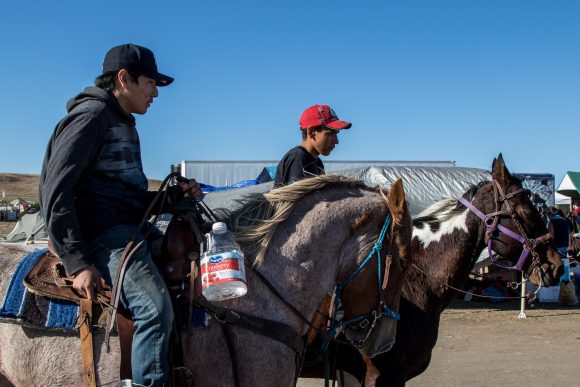President Donald Trump signed executive actions on Tuesday to advance the construction on the Keystone XL and Dakota Access Pipeline, two prospective oil pipelines that have caused major protests over environmental, health and tribal rights concerns.
The Keystone XL Pipeline, a 1,179-mile long pipeline that would create a direct route from oil extraction sites in Alberta, Canada to Steele City, Nebraska, had been rejected by then-president, Barack Obama, in 2015. Obama’s move was praised by environmentalists and hailed as a win for the planet, since it showed a shift towards cleaner energy policies. The Dakota Access Pipeline caused similar environmental concerns over potential spills It also sparked protests regarding issues of tribal rights, as the pipeline became a symbol for the long time struggles of Native Americans across the country.

Young Sioux from Standing Rock take off of school to be in the protest camps in late October. (Jackson Barnett/CU Independent)
The memorandum signed by the president outlines a policy that holds that completing all 1,172 miles of the Dakota Access Pipeline “serves the national interest.” It directs the Army Corps of Engineers to expedite the review and approval of the pipeline, consider rescinding the Dec. 4 easement denial and consider withdrawing the full environmental impact study launched on Jan. 18 by the Corps.
These actions show that Trump’s administration is intent on making good campaign promises to promote U.S. energy as a part of a grander, “America first” plan. In campaign speeches, Trump rallied to revitalize the declining coal industry and support the recent uptick in natural gas production, leading him to win many counties and states whose economies rely primarily on those industries.
“Political activists with extreme agendas will no longer write the rules,” then-candidate Trump told a crowd at an oil industry conference in Bismarck, North Dakota, approximately 50 miles north of where the Dakota Access Pipeline would cross the Missouri River. At that time, in May, protests had yet to balloon into the encampments of thousands of people that, along with legal action, were able to push the Army Corps of Engineers to deny the easement allowing the pipeline to cross under the Missouri River.

Sam “Hughie” Nelson sits in the truck he uses to deliver wood around the protest camp, Oct. 22, 2016. (Jackson Barnett/CU Independent)
Speaking with reporters, Trump promised that the pipeline would bring construction and manufacturing jobs to Americans. “If we are going to build pipelines in the United States, we should build the pipes in the United States,” Trump said to reporters.
He also mentioned that building the Keystone XL Pipeline would create “28,000 jobs, great construction jobs.” Yet a state department report in 2014 concluded 3,900 direct construction jobs was a more actuate estimate. This report does not include potential manufacturing jobs from steel production, yet even with those it is unlikely Trump’s 28,000 job figure would be made directly by the pipeline’s construction.
The stock of Energy Transfer Partners, a U.S. Fortune 500 natural gas and propane company, rose over three percent since the announcement of Trump’s executive action. Trump sold his shares, at one time estimated as anywhere from $500,000 to $1 million worth of stock, in the summer of 2016 after it was decided that owning shares posed a potential conflict of interest.
Contact CU Independent Visuals Editor Jackson Barnett at jackson.barnett@colorado.edu.
